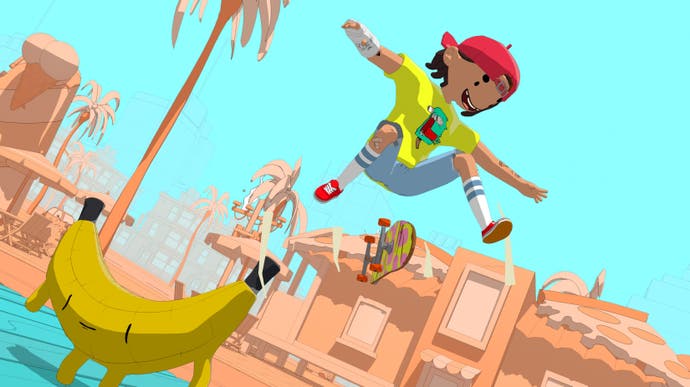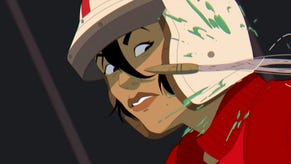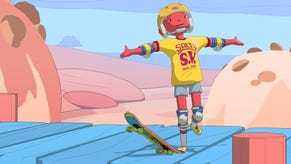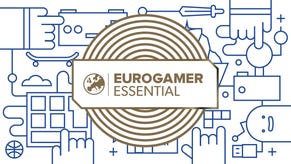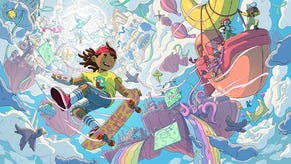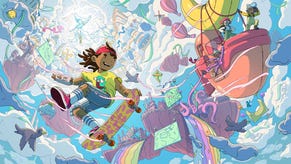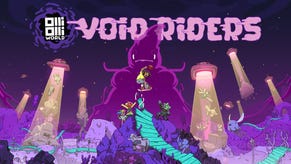OlliOlli World review - a candy-coated dream
Diversions of the field.
Logfolk Graveyard is where it happened. There should be a plaque really. In a game where time can become a bright fizzing blur, I somehow remember the exact moment. I had been zooming through OlliOlli World until that point - always cheery, sometimes doing well, sometimes just scraping it. But then Logfolk Graveyard came along with the optional challenge: Advance trick through a Ghost.
I bloody love ghosts. All levels here have optional challenges, but that ghost! I realised I definitely wanted to trick through it, to advance-trick through it even! So I had to do what I so rarely choose to do in games. I had to do something that, in a game with the sheer headlong pelt of OlliOlli World, seems like breaking an underlying law. I had to go back. Back to the tutorial I had sped through hours before and forgotten, back to the heart of the advance tricks system to gain a proper understanding of these beautiful, terrible things. Back so I could get them down.
OlliOlli World is the latest and wildest entry in a sublime series of 2D skateboarding games. The basics have remained unchanged for obvious reasons. Back in 2014, Roll7 devised a stick-flicking system that seemed to capture skateboarding in the very joints - in the knees and ankles, and in the moment at which the human body becomes a lively species of car jack or shock absorber. You hold and then release the stick in order to trick: choose a direction and see what happens. Can you land it? Can you link it together with other tricks? Can you incorporate a grab? Whatever.
But advanced tricks build on that with a bit of Street Fighter 2. Hold the stick and then do a quarter turn - or more than a quarter turn. It's harder. Harder to do in a rush, and you're always in a rush here. Harder - for me at least - to internalise. Anyway, this is the juddering, racing, crunching heart of OlliOlli and it remains, as I said, unchanged here. You don't need to press a button to land properly anymore - though you still can if you're fancy - and I feel like the push button may have moved places, but basically, on wheels, this is the same beautiful thing it always was.
Yet it's all expanded! The first two OlliOllis were truly 2D affairs, scrapbook flat. Pixelart on the first outing I think, and then smooth Hoxton ad agency vectors for the second: Bonanza Bros backdrops frozen in the instant of a perfect sunset. OlliOlli World, meanwhile, kicks things into Cel-shaded 3D, with wobbly, squishy, flappy characters embarking on a gorgeously silly adventure across cartoonish ice-cream coloured landscapes.
Models and assets are 3D, but the world bucks away from the 2D plane a bit as well. You will have points in a run where you can switch tracks, say, hopping from this route to that route, and maybe that route curls up and over and threads through the first. There will be half-pipes that push you back the way you came, but on a different thread. You may move in and out of the screen a little, somehow never sacrificing readability. The game is still broken down into bespoke runs or levels, but those levels are knotted together to tell a story, to form a series of proper oddball places you move through.
It's beautifully done: pen doodles converging with cartoon seagulls and dense, oaky forests. My favourite area is probably the factory stage where you race over production lines and duck toxic sludge, sometimes skating on a moving platform. Later on there's a sci-fi cityscape with truly epic drops and some brutal chains of wall-riding. The soundtrack, meanwhile, comes across like the Wii's OS music covered by Mr Scruff and Statues-era Moloko: squidgy, chirpy, cheeky, zappy. The perfect tunes for the cocktail lounge of a Holiday Inn perched on the rings of Saturn, which might as well be where everything takes place anyway. But more than that there's the gravelly run of wheels on seamed concrete and the click and clack of boards in motion. A pleasure for the ears. A treat.
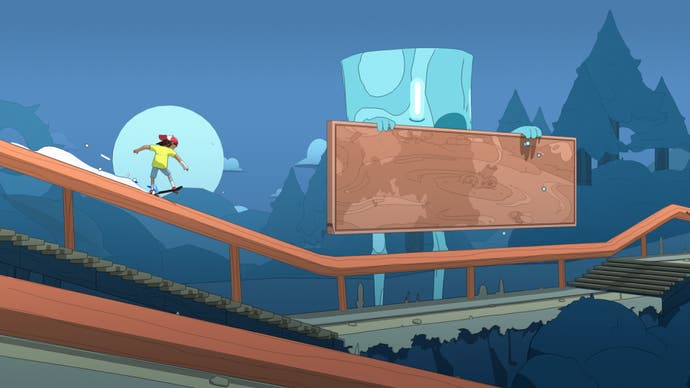
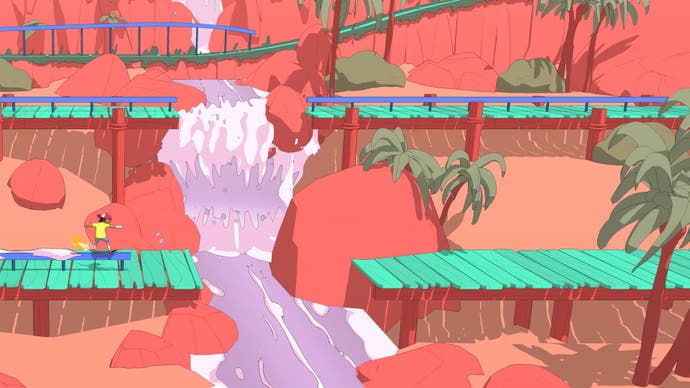
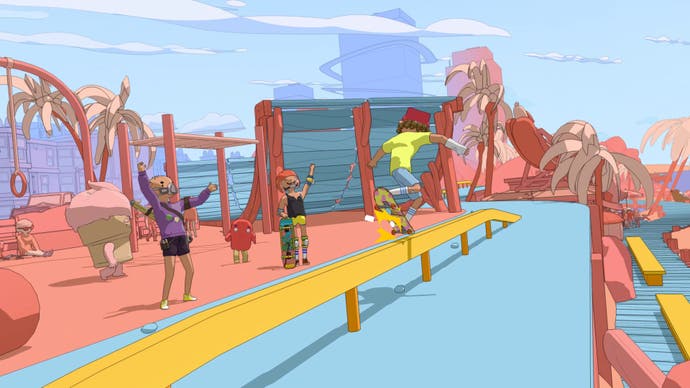
Some of the runs by themselves are heart-stopping, chaining grinds and barriers and wall-dashes together in proper Morse-code blasts of dexterity and panic. Throw in branching routes, inventive screen furniture and new skills - some of them delivered surprisingly late, like stair-riding - that send you back to earlier courses to uncover new routes, and you already have a game with a huge heart: a skateboarding, platforming, memory-testing epic.
But this is a skating game, and these games are always two games in one. OlliOlli World is a case in point: at first you just have to get to the end of each level. But then you want to advanced-trick through a Ghost, don't you? Optional challenges tug you into seeing the level you just battled over as a series of fresh possibilities. And then you're through that barrier and the whole world is filled with possibilities absolutely everywhere. Two games in one: a blend of platform hurdles that are fixed and that you need to ace, and then those gaps for self-expression and doing extra tricks and chains and grabs and manuals and spins for wild points. Oh, those gaps! Find them! Create them! (Mind them.)
So you sound out a world that is already intricate. You sound it out for possibilities. And you know, I recognise this feeling. (Thanks to Edwin here, whose wonderful recent piece on poetry and battle systems has primed me for this way of thinking.)
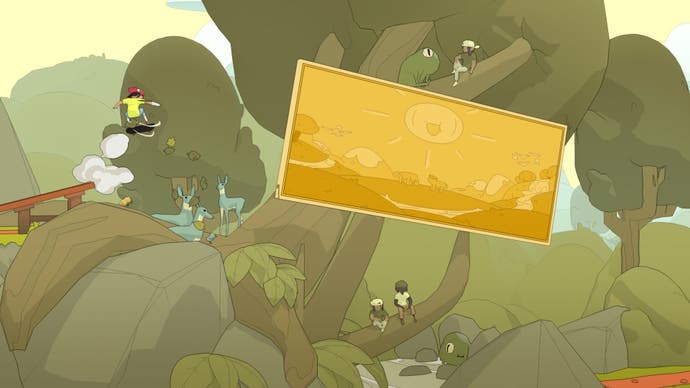
This feeling. The writer John McPhee calls it Draft No. 4. He is talking about writing. Super quick, because we're in the middle of a review for a skateboarding game, here is what he says: "After reading the second draft aloud, and going through the piece for the third time...I enclose words and phrases in penciled boxes for Draft No. 4. If I enjoy anything in this process [by "process" he is talking about writing in general here] it is Draft No. 4. I go searching for replacements for the words in the boxes."
Listen: those penciled boxes. McPhee is talking about words that "fulfill their assignment but seem to present an opportunity." Replacing them, I think, is where we often get richness and something truly memorable, something unique in a piece of writing. You look for spaces where you can do something a bit special. A trick. A manual to link it to another trick, maybe with a grab. An advanced trick. Mercy. And the world opens out a bit. The sun is a little brighter in the sky.
This stuff has been true of all OlliOllis, but it also links these games to the wider genre, and makes them part of the wider fabric of skating fun. Take Tony Hawk: a space to explore first, but also a space to subsequently transform with your own movement through it. This push towards making things your own, covering them with your human acrobatic scrimshaw, is true of the entire world of skating games. This is the genre to which it often feels all other genres should aspire - in terms of challenge, yes, but also in terms of the sheer capability for expressiveness. We often follow the critical path in a first-person shooter, but in skating games we are all fated, as Oliver Sacks once put it, to be individuals. (He wasn't talking about skating games.) And what could be richer than that? OlliOlli World excels in this territory.
Speaking of richness. Oh the quality of poetry this game leaves in the reviewer's notebook: Investigate the little cloud world. Blue triangles. Pink shapes.
In order: the cloud world allows you to access a couple of extra modes. One is a sort of procedural generation tool that lets you make your own runs and share them via a postcode system. The other is a league system which allows you to join up with others and set scores as you move through the rankings together.
Blue triangles are optional levels on the map. Pink shapes are side-quests. Each level in the game comes with a basic objective to get to the end and to get to the end without restarting - checkpointing is fair and restarts are brisk - and then additional challenges, as well as "local heroes" with scores for each level to beat, alongside standard leaderboards. Everything is filtered through pastel colours and cartoonishness, tying back into the sense of the game being a world with its own places and celebrities and that lovely story strung through it all. And I haven't even touched on the brilliant character creator for which you are always unlocking new items, but which from the off can spin up pretty much any kind of person you want with a few stabs of the random button.
Draft No. 4. I think OlliOlli World is a game about writing - more precisely, I guess, a game about rewriting - but that's probably because I'm a writer. And it's a reminder to me that writing can be quietly physical. I bought a fountain pen the other day - a cheapy from some site or other, and just the act of using it conjured something that feels very much like OlliOlli in its peak. Namely, the line! That sense of rushing flush over the surface of the fresh paper, leaving behind a glossy wake that slowly bleeds into the white ground. Being partly in control, but not entirely in control. Not always. Creator and audience combined.
In truth, though, this game's probably a perfect glimpse of any activity where there is the cheerful business of learning involved, and where there are many stages of competence to move through, many new things to notice and explore and experiment with as you go. Like writing, yes. Like skating, I imagine. And that's it: I love this game because it's about learning and trying things out. And maybe learning never has to end, and maybe we can try new things out forever.
